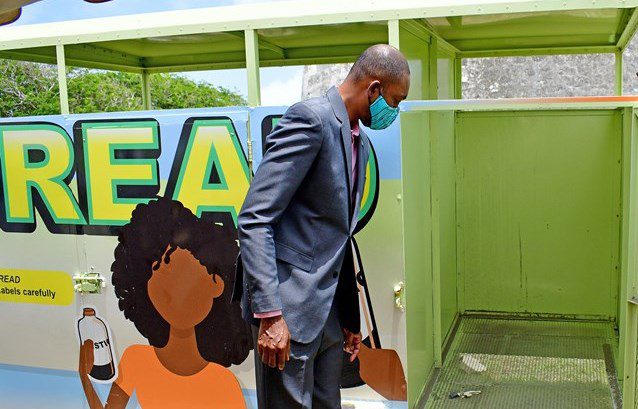
Farmers are being encouraged to take matters relating to safety and health seriously, and follow the guidelines set out in the Safety and Health at Work Act.
Minister of Labour and Social Partnership Relations, Colin Jordan, gave this advice as he addressed the launch of the National Pesticides Container Management Scheme (NPCMS) at the Spring Hall Land Lease Project, Spring Hall, St. Lucy, on Wednesday.
“We want not just from a public health pandemic perspective, but also from a day to day farming perspective to make sure that people are safe; that they are doing safe work, which means engaging in safe work practices in a safe country.
“You, as farmers, have a role to play…in reducing the risk to occupational safety and health impacts,” he said.
The Minister said it was important that farmers followed the guidelines of the NPCMS, which speak to reading, triple rinsing and returning empty pesticide containers to the project for further disposal.
“We can do our part in relation to the contamination of the water supply; contamination of soil; we can do our part as it relates to the disposal of waste. The disposal of waste is something that we ought to be very concerned about because as a small island, we depend…on our fisheries activity, and we know what bad waste disposal does for our marine environment.
“There is run off from the land into the sea when pesticides are not correctly dealt with, and then there is also the issue of containers getting into the marine environment and doing damage,” he outlined.
He explained that pesticide containers contain hazardous materials, which could have significant occupational safety and health implications.

Mr. Jordan further stressed that farmers and non-farmers had a responsibility to themselves and those around them to practise good occupational safety and health habits.
“From an occupational safety and health perspective, we know that exposure to these chemical compounds can impact people on their skin; they can impact us in terms of our respiratory systems; they can also impact internally, if those substances are ingested,” he warned.
Minister Jordan urged farmers to take matters related to safety and health seriously and follow the guidelines outlined in the Act, particularly as it relates to establishing either Safety Committees or Safety Officers.
Noting farmers may need someone to nudge them about good safety and health practices, the Minister suggested that they ensure that there is someone overseeing their operations to keep them “on the straight and narrow”.
“Somebody who will remind you from time to time that you have a responsibility to others and to yourself to maintain good safety and health practices,” he said.
Mr. Jordan said the NPCMS was a programme which not only spoke to the potential negative impacts of pesticides, but issued them with a call to action by reading, rinsing and returning the containers.
This was the second launch for the scheme in Barbados, which is one of 11 countries where the Regional Pesticides Management Project is being executed.
Under the project, farmers are being encouraged to read the labels on pesticide containers; puncture and triple rinse them and return them to the designated sites at the River Plantation in River, St. Philip, and now the Spring Hall Land Lease Project at Spring Hall, St. Lucy.
